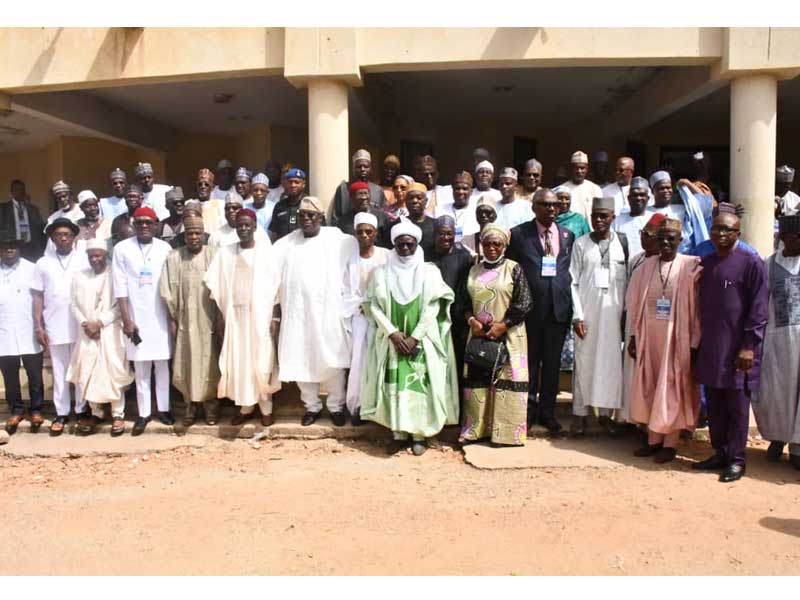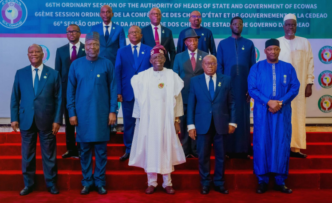From November 25 to 28, 2024, the Katsina State government hosted the annual conference of the National Council for Civil Service Commissions (NCCSC). This is coming on the heel of a hiatus of over ten years. This fact in itself immediately speaks to a significant issue in the ineffectiveness of the gatekeeping function of the civil service commissions in Nigeria. If the body in charge of the gatekeepers has failed for over ten years to adjudicate on their effectiveness or otherwise, it raises a cause for concern. However, the conference theme — “The Role of the Civil Service Commissions in Driving the Renewed Hope Agenda” —signals a readiness of the NCCSC to regain its constitutional function in regulating the affairs of the civil service commissions in Nigeria as a means of getting the public service to function effectively as a mechanism for democratic governance and development effectiveness.
Apart from my keynote as the chairman of the federal civil service commission (FCSC), three significant technical sessions were also facilitated by distinguished resource persons who are well-versed in the signifiers of the defining challenges that the public service faces from their different vantage points of expertise. Professor Adeola Adenikinju is the president of the Nigerian Economic Society and had been involved in national planning designs, macro-economic policy change management and advisories for decades; Mr Soji Apampa, the founder of the Convention on Business Integrity, had contributed to conversations and praxis in the building of national integrity systems as systemic bulwark in the anti-corruption campaign, and as essential pillar in the values reorientation dimension to national cultural adjustment dynamic; and Prof. Abdullahi Shehu, a professor of criminology, is the former Nigerian ambassador to the Russian Federation, has core expertise in capacity building on anti-corruption policies and mechanisms; promoting integrity as vital component of governance and institutional reforms, and anti-money laundering and terrorism financing. Between the three of them, they highlighted several fundamental issues. First, there is the critical role that the civil servants must play in deploying transparency, accountability, professionalism and innovation in facilitating the efficient and effective implementation of the key priority areas of the Renewed Hope Agenda of the Tinubu administration.
In my keynote, I laid a fundamental emphasis on the transformation of the CSCs as the ultimate game changing agent that is committed to a renewed governance partnership with the government through the institutional reform of the public service. And the objective of this reform is to achieve the re-institution of a professionalized, competency-based, meritocratic, and efficient value institution in Nigeria through the effective monitoring of the constitutional gatekeeping mandate. This demand that the CSCs be capacitated sufficiently to facilitate, in the shortest possible time, the emergence of a new generation of public managers who are patriotically committed to the reconstitution of the public service for effective and efficient service delivery in Nigeria. This will demand, within the framework of the renewed governance partnership, the establishment of performance contract with the employees of the MDAs, and a service compact with the communities of service and practice of public administration in Nigeria, as well as with the Nigerian citizenry. This compact will instigate the generation of flagship reform and service initiatives, change programmes, peer review platforms and learning events that will likely keep the various CSCs of the federation engaged all year round.
A brief historical excursion will throw into broad relief the emergence of the civil service commission as the handmaiden of the British government in ensuring the institutional sanitation of the British civil service as the fulcrum of meritocratic efficiency. It will also firmly ground the significant relevance of the Katsina Declaration as a critical watershed in getting the CSCs to gatekeep the vocational significance of the civil service in making the Renewed Hope Agenda crucial for the betterment of Nigerians. Through its evolution from the ancient pharaonic Egyptian society to the monarchy in Britain, it had been difficult for public administration, or the appointment of public servants, to be divorced from the whims of the king or the emperor. Indeed, the Crown deployed the civil service as a system of patronage that is, of course, determined by political consideration and ridden by corruption. It is a system that flouts the politics-administration distinction which is meant to separate between politics and administrative matter for a meritocratic administrative efficiency. However, by the time the Magna Carta had been crafted in the 13th century, there was already a growing need to separate politics and administration, and orient the status of the civil servants on the state and not the Crown.
Advertisement
Much later, and specifically in 1782, some series of economic reform programmes were initiated to effectively deal with the system of royal patronage and decrease the influence of the King on the legislature. Even though this reform had a political motive, its unintended consequence on administration was the emergence of an efficient and non-political civil service. In other words, as the officials who were gradually removed from political activities became more non-political, they also increasingly became more permanent. It then became increasingly impossible for any of these administrators to lose their positions on political grounds. The early eighteenth-century Britain therefore began to see the gradual rise of non-party officials who remain in place when government changes. This led to the second reason that facilitated the separation between politics and administration. As administration was consolidating its autonomy, politics was equally becoming more complex for a minister to ever think of combining it with administrative activities.
It was at this period that the term “civil servants”, as opposed to the military servants deployed by the East India Company, was first used in India. By this time, it was already settled that a permanent civil service could only be secured by the establishment of a security of tenure for public servants. On the other side of the Atlantic in the United States, the Pendelton Act of 1883 was promulgated to undermine the spoil system which made political patronage the basis of recruitment into the service. The Act recognized the significance of competitive examinations as the basis for ensuring merit in the recruitment of civil servants. It was founded on three specific objectives: (a) the use of competitive examinations for admission into public service; (b) provided job security for public employees; (c) prohibited political activity by the civil service; and (d) encouraged a non-partisan approach to an employee selection
However, by 1854 two very significant reform reports were submitted that would transform the administrative efficiency of the British civil service and redeem its status as a noble vocation. The Report on the Indian Civil Service and the Northcote-Trevelyan Report were both meant to safeguard the system against recruitment practices that will undermine the relevance and utility of the civil service for the British government. The Report on the Indian Civil Service was meant to institute specific intellectual tests which will constitute the moral standard for cultivating unique qualities—“industry, self-denial, a taste for pleasure, not sensual, a laudable desire for honourable distinction, a still more laudable desire to obtain the approbation of friends and relations”—that will stand the civil servants out as public spirited and professional.
Advertisement
On the other hand, the Northcote-Trevelyan Report is even more revealing. In specific terms, the Report was based on four basic premises:
- Recruitment into the Civil Service should be by open competitive examination, the examinations would be conducted by an independent Civil Service Board who would ensure that entry into the service would be entirely on the basis of merit.
- Entrants should not be recruited for life into a specific department but would enter a Home Civil Service that would facilitate inter-departmental staff transfers. Civil servants, therefore, would need to have had a general education and to be generalist rather than specialist in their knowledge and experience.
- Recruits would be segregated at entry into a hierarchical structure of grades, ranging from the lowest (mechanical) level of clerical officers, only capable of simple routine task, up to the most elevated (intellectual) administrative level which would provide the ranks of senior civil servants who exist to assist and guide ministers in the formulation and administration of policy.
- Promotion ought only to be on the basis of merit and should not be on the ground of preferment, patronage, purchase or simple length of service (Pilkington, 1999: 19).
These two reports inaugurated the emergence of the civil service commission in Britain. There are two implications for the civil service system in the Commonwealth that inherited the British administrative system. The first is the understanding of the politics-administration dynamics that specifies the relationship between the minister and the civil servants. In other words, the CSC becomes the institutional mechanism that would ensure that the civil service system retain its objective of producing intelligent, efficient and effective public servants that would be able to help implement government policies. The second implication is the emergence of the cadre system which ensures that entry into the civil service is gained through competitive examinations. This served as the basis for the establishment of a generalist class—administrative, executive and clerical—as the administrative echelon of the civil service system in a descending hierarchical order of responsibilities and qualifications.
If, as it has become clear from the bureau-pathology of the civil service in Nigeria (and the various technical sessions at the Conference), that we have not kept faith with the founding mandate that inaugurated the CSC as the gatekeeping mechanism for constantly reinventing the civil service as a noble calling, how do we then commence that reform? What are the fundamental next steps to be taken in pushing the CSCs in the right reform directions? The ultimate objective is the restoration of the CSC as the efficient gatekeeper for professionalism and service integrity enabled by a constitutional mandate to serve as the defender and protector of a merit system grounded on a competency-based human resource management practices in the civil service.
Six fundamental steps are possible to get the CSCs in Nigeria to this ultimate objective. One: there is the need to professionalize the CSC secretariat so as to capacitate it as the core change space for resolving all human resource and other related issues concerning the public administration profession in Nigeria. Two: there is the correlated urgency to modernize the processes and services of the secretariat through continuing digitization that will enable it to eliminate barriers to creativity and innovation in the service delivery mandate of the public service. Three: the various CSCs need to review and upgrade the guidelines for appointment, promotion and discipline in the civil services, as well as reinforce the standard operating procedures across the various CSCs as a mean of guiding against the incidences of sharp practices, the politicization of staff career management, and the enforcement of strict compliance with the rules of law and the constitutional order in all operations. With regard to promotion, there is the need, for instance, to institute a performance-based promotion system rooted in competency and project-based assessments.
Advertisement
Four: it is also imperative to undertake a comprehensive review of the CSC’s delegated powers to the MDAs in terms of operational guidelines with a view to strengthening oversight, compliance and enforcement. Five: it becomes imperative that all CSCs must strategically collaborate with their respective heads of service to undertake and facilitate the value audit of the civil service that will achieve the objective of enforcing discipline in terms of the code of conduct and code of ethics of the civil service. This will be to articulate a cultural adjustment programme and value reorientation of the civil service as a noble calling. Six: the CSCs must embark on studies to profile changes and transformations in the emerging new public service, especially in terms of the new normal demanded by COVID-19 transformation of the workplace, the increasing changes enforced in the nature of administrative processes due to new digital technologies and artificial intelligences, and the peculiar sociological imperatives of emergence of the Gen Z and Gen Alpha and their impact on the nature of work. This new normal articulates urgent administrative measures that are demanded for situating the public service within the urgency of relevance for the fourth and fifth industrial revolutions. Seventh and finally: each CSC must align these new reform directions and imperatives with their implications for industrial relations. The plan must be to shift the focus away from the adversarial to developmental labour activism and relations that make possible sustainable change agenda in the public sector.
Setting out on these reform directions requires specific reform strategies and focus of implementation. It demands, in other words, change management requirements that are specific for getting the CSCs up to speed in its intent of achieving its constitutional role as the powerhouse for the enforcement of merit-based competency in the civil service. The NCCSC Conference threw up lots of strategic reconsiderations that promise significant reform rewards—in terms of facilitating the “Katsina Declaration”—for advancing the effectiveness and efficiency of the civil service in Nigeria as a world class institution for backstopping democratic governance and the Renewed Hope Agenda of the Tinubu administration.
One fundamental and pressing business the Conference threw up which has an overarching impact on not only firming the rearticulation of the public service as a new institutional brand—as a vocational calling—is the urgency of promulgating a Public Service Act as a legal tool for codifying the instrumental efficiency of civil service governance and operations. The need for the Act derives from the argument that the inherited administrative codes such as public service rules, financial regulation, guideline on administrative procedures, etc., which have their deep roots in the British unwritten constitution tradition, have become outdated, especially in the light of contemporary postcolonial realities in Nigeria. This is also more so that the British that bequeathed this administrative tradition has evolved beyond it to enact numerous legislations for the governance of the public service.
This Public Service Act also has deep implication for strategically revisiting the staffing requirements of the civil service, but specifically that of the CSCs. This speaks, for instance, first to the generalist framework that constitutes the CSC secretariats’ skills set. This framework grossly limits the CSCs and their problem-solving capacity to resolve various career management issues involving staff. This is further complicated by the high turnover rate and other challenges associated with staffing the CSC from the civil service common pool. The next strategic consideration derives from the urgency of digitization and automation that must be the basis of modernizing the CSCs’ critical operations. Recruitment, for example, requires online application portals that are back-ended by effective databases. Promotion also demands online recalibration in terms of accreditation and CBT assessments. Discipline and appeals can be fast tracked through the deployment of software that tracks reports, cases and processes.
Advertisement
Civil service commissions will need to capacitated to be much more effective and efficient within the context of available funds and resourcing frameworks. The FCSC and the state CSC will therefore need to become creative in sourcing for a range of technical supports to raise funds that will enable critical studies.
- First, there is the need to reinvent the CSC founding mandate to deepen guidelines that undergird merit in entry-level assessment and to infuse better contents and standards to, for instance, review quality of the syllabi and questions in the computer-based tests at promotion exams.
- Second, the CSCs need to deepen the guidelines for grounding the application of the federal character policy on merit and meritocratic parameters in the recruitment process.
- Third, the CSCs need to initiate diagnostic studies to unravel the structural bottlenecks hindering career progression of officers as mean by which to reinvent manpower planning, manpower forecasting and succession planning that articulate a better framework for monitoring the size and growth of service through internal management controls.
Lastly, the Katsina Declaration emphasized the need to keep the modernizing imperative in sight through the constant organization of seminar events, both virtual and physical, that keep the attention of the CSCs firmly on new and emerging trends and global practices in human resource practices that keep the Commissions on their toes in terms of their constitutional mandate in the new administrative normal.
Advertisement
The Katsina Declaration constitutes another turning point, and a crucial one at that, in facilitating the reawakening of the CSCs to their constitutional mandate. And this is even more fundamental at this period when the Tinubu administration really demands that the civil service regain its effectiveness to be able to translate the policies of government into dividends of democratic governance.
Olaopa, chairman, Federal Civil Service Commission and professor of public administration, can be reached at [email protected]
Advertisement
Views expressed by contributors are strictly personal and not of TheCable.
Add a comment












